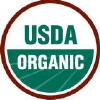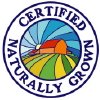The Certified Organic Seals
Most Sought After Worldwide
International Federation of
Organic Agriculture Movements
Of all the certified organic seals, the one which carries the most weight worldwide is the International Federation of Organic Agriculture Movements (IFOAM) seal. This is the international association which sets the standards for organic certification. Everyone who wishes to use an organic seal must meet one or more IFOAM standards. IFOAM's standards are designed to:
1. Facilitate the development of organic standards and third party certification worldwide.
2. Provide an international guarantee of these standards and organic certification.
Follow this link to learn more about
IFOAM.
USDA Certified Organic Seals
A USDA Certified Organic Seals are no doubt the most recognized in the world. Suppliers worldwide want to qualify their products to use a USDA organic seals. By doing so they are allowed to sell their products to the huge North American market.
The levels of USDA certification are:
100% Organic
Must contain 100 percent organically produced ingredients (excluding water and salt). This is the only label that guarantees a completely organic product. (These products can carry the USDA 100% Certified Organic Seal.)
Organic or Certified Organic
At least 95 percent of content is organic by weight (excluding water and salt). Any remaining product ingredients must consist of non-agricultural substances approved on the National List including specific non-organically produced agricultural products that are not commercially available in organic form. (These products can carry the USDA Organic Seal.)
Made with Organic Ingredients
At least 70 percent of content must be organic (excluding water and salt). The front panel can say "Made with Organic" and list up to three specific ingredients. (These products cannot carry any USDA Organic Seal.)
Less Than 70% Organic
Can list only organic ingredients on ingredient panel, but not on front panel. (These products cannot carry any USDA Organic Seal.)
Follow this link to learn more about the
USDA Organic program.
Certified Naturally Grown
Now, having said that, we feel that it's important to point out the following. There are many high quality products which meet, and in some cases exceed, the USDA standards but do not carry a USDA organic seal.
Most of these products come from farms which are operating on such narrow profit margins that they can not afford the high fees associated with being certified.
When the USDA program was implemented many of these farms were faced with a difficult decision. Pay the high fees and fill out mounds of paperwork to be certified or give up using the word organic on their products.
Believing that neither was the right choice for them, a group of these farmers joined forces and created Certified Naturally Grown (CNG).
CNG standards take as their starting point the USDA standards. CNG is in no way affiliated with the USDA program. To learn more about CNG please visit the
Certified Naturally Grown web site.
So, whether it's one of the
USDA organic seals, or one of the many others, look for them first when shopping.
Return from certified organic seals to the Organic Living Home Page

